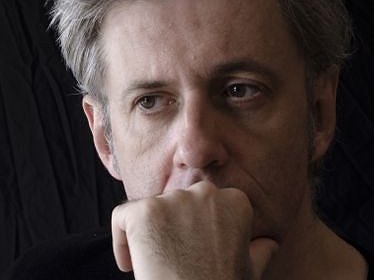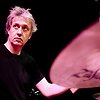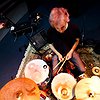What were some of your main artistic challenges when starting out as an artist and in which way have they changed over the years?
The first major challenge I felt when I started out was the idea that how I played, didn't really sound the way other people played. I wondered why and tried to find ways to sound like others. As I mentioned, I play a drum-kit that is set-up right handed but as a predominately left handed person I always felt somehow different. It took me a long time to see the advantages in this situation as opposed to the disadvantages, which usually only had to do with convention and expectation. It took a long while to realise this.
I guess over time, the challenges I face have more to do with conceptual ideas - how to reconcile different, sometimes quite contrasting or contradictory ideas about music making - form, function, aesthetic focus etc, and making cohesive statements as an artist - what different projects mean to me; the things those projects focus on, within the context of my life as an artist and the various areas I am interested in.
The bands I play in exist to explore some of these different, sometimes diametrically opposed ideas. Within The Necks, for example, I explore the ideas of duration, repetition, transition and improving within the sound of the space. My group Transmit explores my interest in deconstructing song forms and the influence and energy of rock music. My group Spill with Magda Mayas explores the interconnections of timbre and approach between the piano and percussion. Reconciling all these approaches and projects seems to be the biggest artistic challenge for me. They are all different but I see them all as different sides of the same polyhedron!
What do improvisation and composition mean to you and what, to you, are their respective merits?
I don't really think in terms of a binary relationship between composition and improvisation. Improvisation is a tool used to create music in the moment - music where various specifics haven't been formulated before the event. It gives you the opportunity to respond to the situation at hand, without having an obligation to fulfil some preconceived idea or function. Improvisation is a compositional tool in much the same way as the 12 tone row or the sonata form are tools used to compose music. Different contexts and different endeavours call for different approaches.
Every time I play a concert I feel I am composing new music. It’s not always made up of music I have never played before, but it is new, and at best, most appropriate for that situation, space and time. I think of it as composition, although of a more ephemeral nature than that of notated composition.
Improvisation, in all its degrees, is a method of composing. Composition can utilise both carefully considered and refined ideas and systems as well as spontaneous arrived at ideas. Improvisation equally can utilise various structural elements within which to influence and frame the music - from harmonic schemes or simple temporal frameworks to the decision or application of set limitations. The very sound of the room itself is a major contributing factor. There are always many influences shaping the way improvisations develop. These aspects, the harmonic schemes to the simple temporal frameworks, can likewise be tools of composition.
I understand for many people, some of whom I play with often, feel that improvisation represents a kind of musical-social-political model, and I am sympathetic to and appreciate that idea. While I also adhere to that philosophy to a degree, I also have no problem with the idea of treating improvisation as a more pragmatic element of music making in it’s many guises.
Both approaches can exist within the spectrum of music-making simultaneously and to differing degrees. Its definitely not black and white, either-or.
How do you see the relationship between sound, space and performance and what are some of your strategies and approaches of working with them?
I have come to realise that the sounds we make exist in the spaces in which we make them and that space cannot be separated from the sound itself. One aspect of the preconceived notions of what sounds to make, how to layer them and present them that I find problematic, (ie: pre-composed music conceived-of outside of the performance space ) is that the different spaces in which the work is to be performed are not taken into consideration in any really meaningful way. There are acoustic spaces where some ways of making music, or even, for example, some specific pitch, timbral or dynamic information, simply won’t work in the space in which they are trying to be forced.
( We’ve all heard the disastrous results from hard-bop or rock bands trying to pump their music, with all its structural and stylistic obligations, into totally inappropriate acoustic spaces like churches and massive warehouses!)
I find this situation one of the main advantages of approaching performance with a certain amount of improvisatory flexibility. One can find sounds and sound relationships that work and translate in the space, shaping a music there and then that is most appropriate for the situation at hand. Things like finding or sounding out the various standing waves and resonant frequencies of a room and either avoiding or exploiting them. Playing with the reverb and echo times presented by the space. If one has no obligation to play a preconceived piece or fulfil some function within an ensemble, then these things are all available to use as structural elements or inspirations and make the music making undertaking more successful.
Derek Bailey defined improvising as the search for material which is endlessly transformable. Regardless of whether or not you agree with his perspective, what kind of materials have turned to be particularly transformable and stimulating for you?
The material one draws upon in the process of making music is multi-facetted. Whether one speaks of materials such as the instruments, (their nature, construction and sound) or the structural elements and approaches making up the music itself, (harmonic, rhythmic approaches, density or timbral ideas), the space within which the music is created or context or function of the music being performed… there are so many aspects to the idea of material.
Within the context of improvisation it is advantageous to find approaches that offer a great amount of flexibility, whether that is within the instrument itself - the approach to aspects of playing it, and the music itself. In other words, the development of skills with which to respond quickly to changing situations is an advantage when improvising, whether this is within the technical playing of the instruments themselves or having an arsenal of sound sources that can produce a rich variation of sounds and timbres and dynamics.
While it's important to develop clarity and articulation, it's also interesting and useful to engage with certain ambiguities the materials (in every sense of the word) present you with. Whether, for example, this is finding ways to play a particular instrument or sound in both an aggressive and harsh manner as well as in a fluid and gentle way; or perhaps playing material with a rhythmic forward motion while maintaining an ambiguous sense of metre, pulse or time definition.
I guess in these approaches, the search for endlessly transformable material is advantageous within the context of instant composition.
The one thing I'm interested in more than any other is these moments of transition, where one thing becomes another… the points between. Transition and transformation. This in itself, to me, is the search for the endlessly transformable I guess.
Purportedly, John Stevens of the Spontaneous Music Ensemble had two basic rules to playing in his ensemble: (1) If you can't hear another musician, you're playing too loud, and (2) if the music you're producing doesn't regularly relate to what you're hearing others create, why be in the group. What's your perspective on this statement and how, more generally, does playing in a group compare to a solo situation?
This kind of common sense approach to playing music in an harmonious way with other people, does preclude other, perhaps more interesting and creative approaches to organising and playing music in an ensemble. Ways that could be, in the long run, very productive or surprising and offer up new, unforeseen results - getting players out of their usual comfort zones.
Sometimes the sound of instruments being buried within a more dominant sound in a group can give rise to interesting dimensions and depths within an ensemble texture that offer up many options for the unfolding music. Sometimes one is challenged to put one self into situations that are new or uncomfortable and the results can be inspiring, enlightening and unforeseen.
By themselves these rules and adages are all well and good, but in the huge variety of approaches to making music they are a little simplistic. Playing solo is quite another thing to playing in an ensemble in many ways. In other ways not! Of course, with no one else to bounce off of, no inspiring input from others, totally left to your own devices brings both positive aspects and challenging questions to ponder. One aspect of solo playing I appreciate is finding a self-generated organisational and structural approach.
I remember reading something by Anthony Braxton about the need to characterise and catalogue your vocabulary into distinct sets and subsets of sounds, approaches and techniques that have personal meaning. I've thought about this a great deal and feel it's a good way to organise ideas for both playing and responding with clarity and direction. Having a strong idea of the sounds, forms, structures and methodologies you have at your disposal is invaluable for any musician and playing solo is a good way of having to really think about and apply this way of thinking.
With more and more musicians creating than ever and more, what does this mean for you as an artist in terms of originality? What are some of the areas where you currently see the greatest potential for originality and who are some of the artists and communities that you find inspiring in this regard?
Cecil Taylor said, “You don’t have to be an innovator, but you must have integrity and you must know how to make your instrument live." Some people find a perfect vehicle for their expression in existent forms. Some aspect of their work within these frameworks probably should be exceptionally articulate or clear, but perhaps the idea that they have created work of exceptional originality is not as important. Genres and movements exist and there are examples of great art being produced within these definable frameworks. The very idea of a genre suggests, in itself, that there are various elements, prerequisites and roles that are expected, that have been developed by others and evolve over time.
Having said that, I’m not really interested in hearing people reproduce the style and content of other, more influential artists. Hearing someone with a clear, distinct voice is, to me, a prerequisite for me to be particularly interested. Especially within the context of improvised music, the most valuable thing you can bring to the music and the ensemble is your own voice.
While I can often still hear and feel the influence of various mentors and inspirations within my own music making, the development of a distinctive voice is something I've had no trouble pursuing since finally gaining the confidence that I spoke of earlier. Influences and inspirations run deep and very few artists transcend that. Truly original artist are few and far between. Nothing comes from nothing; there are always precedents.
If there is such a thing as a community within a group of artists, a style or new approach, the very thing that links them together can hardly be seen as representing originality in any real sense. Perhaps one or two original voices and a whole bunch of followers.
What constitutes a good live performance in your opinion and what’s your approach to performing on stage? How do an improvisation and the recording of this improvisation compare?
As a performer and listener alike, the feeling that a kind of transformative experience has taken place constitutes a successful performance. By this I mean the idea or the sense that some marked change has taken place within the mind, imagination or soul of the listener/performer; some sense of a changed perception of the space or time.
Recorded music and live music are very different things. Both situations call for different approaches and compromises. Sometimes the recording of an improvisation goes somewhere towards documenting the experience but mostly it tends to suffer from the limitations and compromises of the technology and the sense that it is removed from the situation, the acoustic space and the moments of creation and therefore lacks the most significant aspects of the music.





